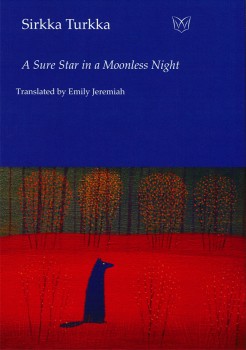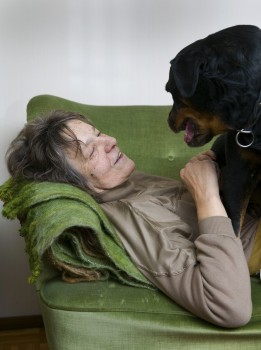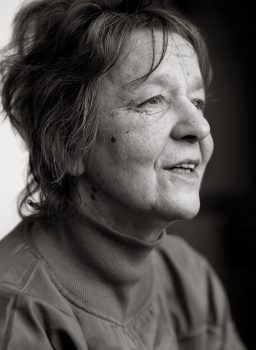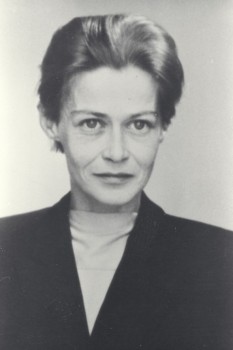Search results for "Sirkka Turkka"
It’s four o’clock and the dog is puzzled
26 September 2013 | This 'n' that

Cover image: ‘Autumn reflections’ by author and painter Saara Tikka
Apart from writing poetry for forty years, Sirkka Turkka has worked as a stable master and as a librarian – and she is a wizard in creating portraits of dogs in her poems.
‘Something kept me awake late. Something woke me up early. It’s four o’clock and the dog is puzzled. He tries to continue his dream: he was just about to catch a squirrel he barked at all of yesterday. He leaves me quite alone in silence, in which not a single breeze stirs. What is in the past ceases to be, what is to come has no significance. There is only the sun, just about to come up. And the calm surface of the lake and the coffee cup, from which leisurely steam rises.’ (From Minä se olen [‘It’s me’], 1973)
Elk, horse, raven, reindeer, jackdaw, fox. Turkka’s universe is populated with creatures, often wiser than man: man may have lost his heart, or ‘he thinks it’s a distant land’, but ‘in dogs the heart is where it should be: just after the muzzle, boulder-like, baby-faced and willing.’ (From Yö aukeaa kuin vilja [‘The night opens like corn’], 1978).
Emily Jeremiah, scholar and translator (her work includes poems by Eeva-Liisa Manner, novels by Asko Sahlberg and Kristina Carlson), found Turkka’s creatures a while ago, and as a result a selection of Turkka’s poems, entitled A Sure Star in a Moonless Night, was published recently by Waterloo Press (UK).
Melancholy: it does go well with autumn, doesn’t it? ‘Once more the stars are like a tearful ballad, and always in the evenings / the dogs tune their cracked violins.’ (From Mies joka rakasti vaimoaan liikaa [‘The man who loved his wife too much’, 1979])
Poems
30 June 1982 | Archives online, Fiction, poetry
Sirkka Turkka is among the most important poets who started their work in the 1970s. So far she has published five collections of poetry and one work in prose. ‘I speak of death when I mean to speak of life,’ writes Sirkka Turkka in one of the poems in her collection Mies joka rakasti vaimoaan liikaa (‘The man who loved his wife too much’, 1979). The theme of death is close at hand, too, in the previously unpublished poems printed below. Introduction by Arto Kytöhonka
1
Before death itself comes
it paints the pine boles red
around this house
It erects a moon in the sky, a luminous moon,
set on edge like an old dish
with the light enamel peeling off.
Onto this house, over which
night is now pleating.
And the house, in the veering waters, in the clinging waters,
is slowly preparing itself, quite by itself, for death. More…
A Note on Nine Contemporary Poems from Finland
31 March 1987 | Archives online, Articles, Fiction, Non-fiction, poetry
Contemporary Finnish poetry, translated and introduced by Anselm Hollo
The last couple of months, it has been my pleasure to browse around in a tightly packed shelf of books of poetry published in Finland in the last five years. On the showing of these, and of the excellent anthology Modern finlandssvensk lyrik (‘Modern Finland-Swedish poetry’, 1980), edited by Claes Andersson and Bo Carpelan, poetry certainly seems to be alive and well in the old homeland. In a way, the sheaf translated here is just first travel notes, individual works that struck my fancy seemed translatable: thus, by no means a ‘representative selection’.
Claes Andersson’s poem ‘When I was born, Helsinki was…’ was quite simply a direct hit (perhaps an unfortunate metaphor in that it deals, in part, with the WW2 air raids on Helsinki) – it brought back personal memories from my early childhood. But beyond those immediate circumstances, it is also a very moving evocation of the magnificent and terrifying world of magic children inhabit. Helena Anhava’s ‘These years…’, with its marvelous image of the great hinge turning in the human psyche at certain points familiar to anyone who has lived into middle age, seemed a fine example of her impressive body of meditative lyric poems, sharing a tenor of wistfulness not uncommon in Finland’s poetry with Bo Carpelan’s ‘You drive up…’, which is also a poem of the pangs of change. In Carpelan’s text, the clash between ‘wonderful clear Vivaldi’ on the protagonist’s car radio and the perceived tawdriness of the environment is beautifully balanced between genuine revulsion for the latter and a self-irony directed against the self-declared ‘finer sensibilities’ of the class that can afford them. Tua Forsström‘s ‘Do you want to hear something’ moves in a lovely dance figure from myth to everyday present: we see the interior world that is Nausicaa’s island shimmering through the exterior in which ‘someone’s/ balcony door whines all night like a cat’. More…
Coming up next week…
7 May 2010 | This 'n' that
‘…A strange tapir / (the bi-coloured one) / a wondrous tapir (the many-toed one) / circles the tree, goes round and about, / a small word hangs from the tip of his snout….’
Helvi Juvonen (1919–1959) wrote nature-inspired poetry; she was a fan of the 19th-century American poet Emily Dickinson, whose work she also translated. Her short adult life, in the drab Helsinki of the post-war years, was burdened by poverty and illness, and yet she wished to ‘toast the richness of our lives’.
The literary scholar Emily Jeremiah has translated a handful of Juvonen’s poems and takes a look at her work in this, the 15th part of a series devoted to classic Finnish authors (also available in our archive are essays about Kirsi Kunnas, Henry Parland and Sirkka Turkka). Helvi Juvonen: small words celebrate ‘the richness of our lives’
Hamlet in blue velvet
22 January 2010 | Fiction, poetry
Physical, mythical, sensual, playful: Sirkka Turkka’s poems, never abstract, speak of life, death, dogs, horses, nature and humans. In her universe the humorous and the grave socialise without effort. These texts, in prose form, with Hamlet as one of the characters, are often set in a wintry landscape (see Nature girl)
Poems from Yö aukeaa kuin vilja (‘The night opens like corn’, Tammi, 1978)
Of his early childhood, Hamlet really only remembered his father’s slightly crooked and gnarled index finger, pointing at the lowest branch of a holly oak. A small owl sat on it. It can’t see anything, it’s asleep now. It won’t fly off until night. These were the only words Hamlet remembered his father saying to him during the first six years of his life. Later, all he saw of his father was his back, bent over in study of agricultural conditions in a village called Jawohl or of waterside traffic on the river Vistula at the turn of a particular century. When it came to governmental matters, the king placed his trust chiefly in his unconscious and in wheat bread, thick white slices of which he devoured from the moment he awoke. More…
Translation prize
27 August 2010 | In the news
This year the Finnish Government Prize for Translation of Finnish Literature – worth € 10,000 – was awarded to the poet, translator, linguist and literary critic Rami Saari who translates into Hebrew.
Saari (born 1963) has studied and taught Hebrew, Semitic languages and Finno-Ugric Language Studies at universities in Helsinki, Budapest and Jerusalem. He has been the editor of the Israeli section of the international poetry website poetryinternational.org since 2002 and has edited a book series for Ha-kibbutz hameuchad which publishes predominantly Nordic and Baltic literature.
Saari, who has also published seven collections of his own poetry, now lives in Athens. He has also translated Albanian, Spanish, Catalan, Greek, Portuguese, Hungarian and Estonian fiction.
Among the Finnish writers Saari has translated are Daniel Katz, Eeva Kilpi, Eino Leino, Veijo Meri, Timo K. Mukka, Sofi Oksanen, Arto Paasilinna, Raija Siekkinen, Eeva Tikka, Sirkka Turkka and Mika Waltari.
Rami Saari received his award in Helsinki on 25 August from the minister of culture and sports, Stefan Wallin. The prize has been awarded by the Ministry of Education and Culture since 1975 on the basis of a recommendation from FILI – Finnish Literature Exchange.
Our favourite things
29 January 2010 | Letter from the Editors
Every reader has his or her favourite book. It is possible to define, with acceptable criteria, when a work of fiction is ‘a good novel’: do the plot, characterisation and language work, does it have anything to say? But when is a ‘good’ novel better than another ‘good’ novel? More…





